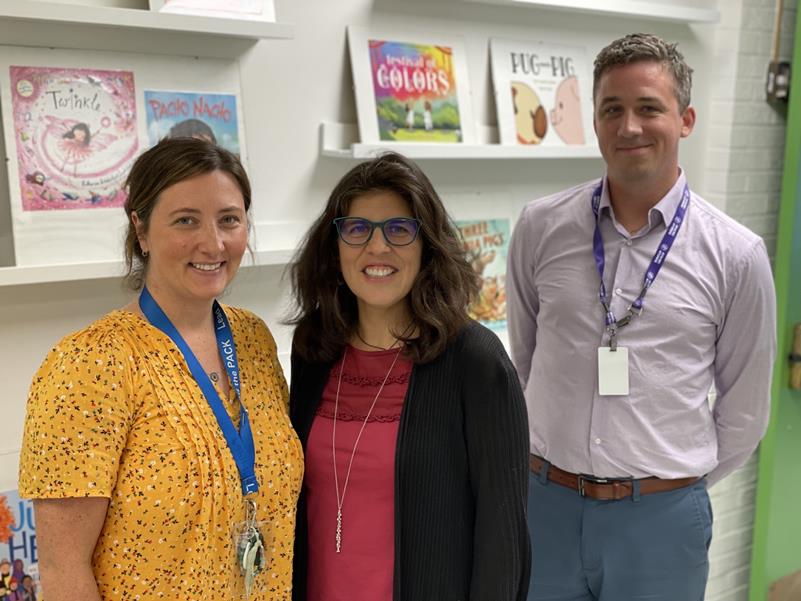
D75 staff members Jill Unger and Ryan Zak meet with Dr. Laura Ascenzi Moreno (center).
A teacher slowly crouches next to a young student who just finished reading a short book. The student’s home language is Spanish and he’s just beginning to read English text.
The teacher asks, in English, what the book is about. The child looks up, hesitates and tries to find the right words to describe what he has just read. But he struggles to explain what he’s thinking. Gently, she asks him to answer in Spanish. His answer is short, but telling. After a few brief sentences, it’s clear the student understood the book.
In assessing the development of emerging bilingual students in their classrooms, District 75 teachers this year are focusing on what students comprehend, not just how well they communicate what they know.
“It’s allowing a student to express their understanding in a language they feel most confident in,” said Jill Unger, District 75 Teaching and Learning Coordinator. “It doesn’t mean we ignore the fact it’s easier for them to explain their thinking of an English text in Spanish. That’s just a signal for us to provide the support so they can also be proficient in explaining in the new language.”
This new mindset in teaching practices is a shift from how teachers have traditionally assessed their students’ level of bilingual literacy. How well the strategy works will really only be understood over time. But at least one educational professional believes that District 75 is getting it right.
Dr. Laura Ascenzi Moreno, a well-known researcher and author on bilingual teacher education, visited District 75 in September to lead staff members through some professional development training. She will return in late November as well.
The idea of assessing a student’s school work is not simply to comply with state and local policies, but to be able to offer better instruction and feedback.
“Eventually, we want students to be able to talk about a book in their new language,” Moreno said. “But during the assessment process, it may be important to hear their re-telling in one language or the other, depending on their language proficiency.”
Ryan Zak, the Director of Linguistic Programs at District 75, said grading English comprehension in an English-only method doesn’t make students’ results valid or meaningful.
“We brought Laura here to give our teachers professional training to make sure our scores are valid,” he said. “Her visit will also empower our teachers to use this reading assessment to drive teaching and learning.”
Moreno called assessment an engine for instruction.
“Assessment has been a key to finding the student’s highest instructional level,” Said Moreno, who is an Associate Professor of Bilingual Education at the School of Education at Brooklyn College, City University of New York. “We want to make sure when we’re assessing emergent bilinguals that their language-based miscues aren’t putting them at a lower level than what they can actually perform.”
Moreno also offered her assessment of the District 75 Bilingual program staff, calling it a positive experience watching Unger and Zak working with their dual language teachers.
“Many of the other districts I’ve visited have not been as proactive as Mundelein in really honing in on assessments,” she said. “There’s a consistent focus on literacy here and not pushing emergent bilinguals aside, but really bringing them to the center. I’ve been so impressed.